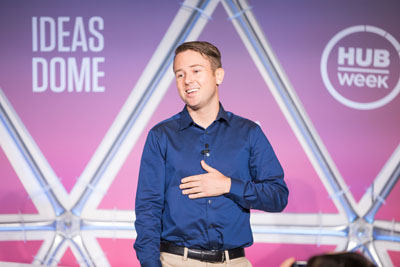
Visit Blue Cross' new health news site, Coverage, for compelling original reporting on health and wellness issues. Sign up to get our weekly headlines in your inbox!
Taylor Carol didn’t stand a chance.
Diagnosed with a rare form of childhood leukemia at of the age of 10, doctors gave him just two weeks to live.
Yet the little boy and his parents refused to give up.
They refused to give up even amid the five years of hospitalization that followed diagnosis, including full-body radiation, drug therapy and a bone marrow transplant that required Carol to remain in isolation for six months. Alone in a sterile hospital room with little human contact, he lost the ability to walk, see, speak and eat. But he didn’t give up.
“In that emotional darkness …. we saw hope,” Carol told a rapt audience gathered for Boston’s annual HUBweek festival of ideas.
By the time he was 17, Carol was a freshman at Harvard.
Today, 13 years after his terminal cancer diagnosis, the 23-year-old Harvard grad is transforming the hospital environment by bringing personalized information and entertainment to patients faced with long hospital stays, disabilities and terminal illnesses
From the hope he clung to in that lonely hospital room, Carol found inspiration, and from inspiration, a mission was born.
That mission has become a nonprofit charity with $27 million in donations, providing support to patients in more than 25,000 hospital beds around the country.
And it all began while Carol was a young patient in the isolation unit at Seattle Children’s Hospital.
“Starting in that room, talking through telephones from one to the other, my father and I started to build Gamechanger Charity,” he told the crowd at HUBweek.
The concept was simple: Collect used video game players and game software that hospitalized children could play with while they were recovering, even in the isolation of quarantine.
Within six months, the family’s garage was filled with donated players and games. “I was incredibly happy and my mom was incredibly mad,” Carol joked.
Soon, the family had to rent two warehouses to contain all the donations.
But Gamechanger Charity didn’t stop there. It has helped develop adaptive game units, including one that allows children without hands to play video games using their mouth. It also offers scholarships to patients who inspire others, so they can fulfill their own dreams.
Carol also began providing augmented reality and virtual reality tools for hospitals to use in distraction therapy, education and end-of-life care.
“Boredom is one of the main causes of pain in the hospital environment,” he noted. “Patients with nothing to do feel their pain magnified.”
Studies find that playing video games can decrease pain levels, potentially making the difference between a patient in agony begging for morphine or one coping well enough to get by with Tylenol, Carol said.
The augmented and virtual reality tools also can alleviate fears, he said. Carol created virtual reality experiences that walk patients through their own medical procedure before it happens, to help them understand what they will undergo.
For end of life care, he’s even developed a platform to help the dying fulfill their last wishes. Want to scuba dive at the Great Barrier Reef or walk through the pyramids at Giza? No problem with augmented reality devices.
He’s now working with Google to bring more augmented reality to hospital corridors.
“No matter what the industry,” he said, “there’s always room for innovation.”
The digital entrepreneur also has started Zott, a private, for-profit cloud-based distribution platform that supplies highly curated entertainment along with educational and clinical content to patients, their families and hospital staffers. And he’s helped raise more than $10 million for the Leukemia & Lymphoma Society.
The boy who once had only his own dreams to cling to has gone on to make the dreams of countless others come true.
